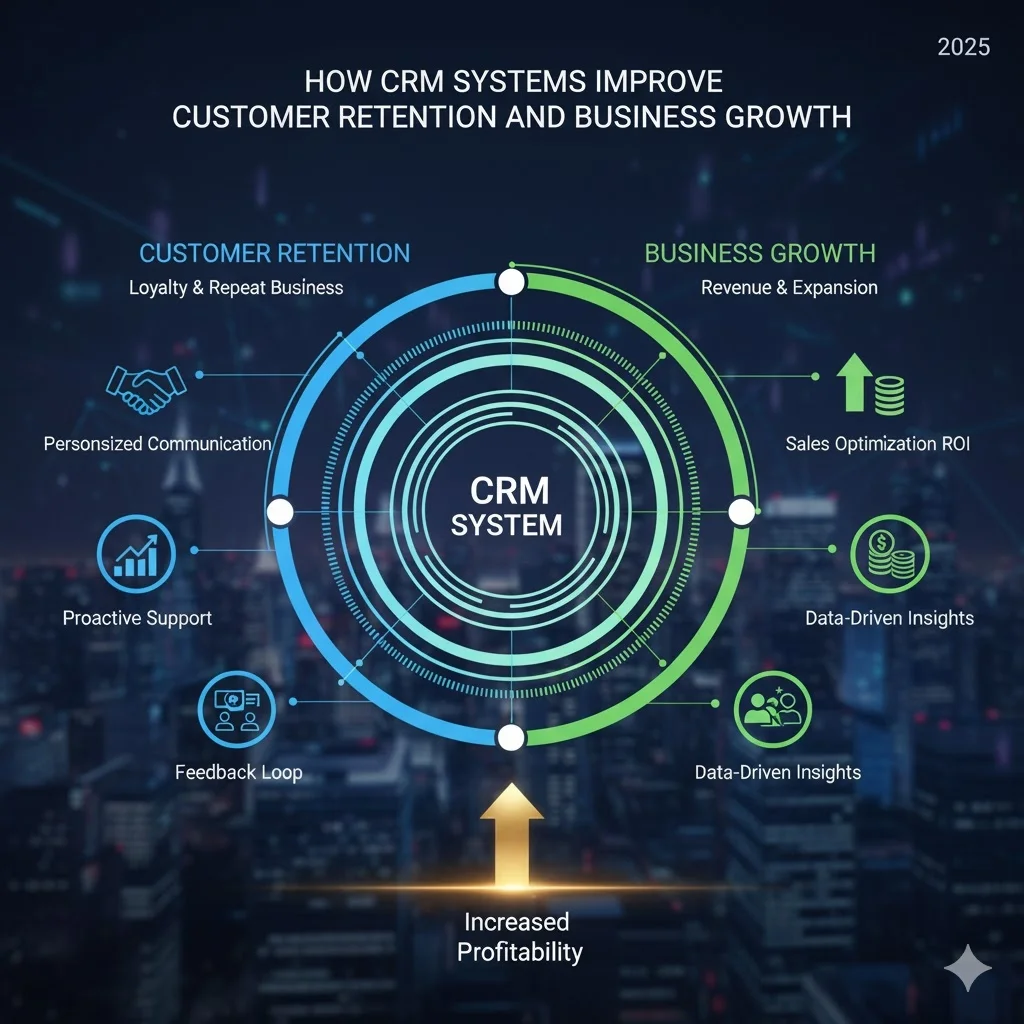In today's competitive marketplace, businesses thrive not just by acquiring customers, but by retaining them. With customer expectations evolving and digital engagement channels multiplying, companies need more innovative ways to build long-term relationships. This is where Customer Relationship Management (CRM) systems come into play.
A well-implemented CRM isn't just a database of contacts — it's a strategic engine that fuels customer loyalty, satisfaction, and business growth. From automating communication to predicting customer needs, CRM systems help businesses create meaningful, data-driven relationships.
In this blog, we'll explore how CRM systems improve customer retention and business growth, analyze the top CRM benefits for businesses, and look at real-world CRM success stories that prove the power of customer-centric technology.
Understanding CRM: More Than Just a Software Tool
At its core, CRM (Customer Relationship Management) is a technology-driven approach designed to manage interactions with current and potential customers. It unifies data from multiple touchpoints — sales, marketing, customer service, and support — into a single, cohesive system.
But modern CRM platforms go far beyond contact management. They use AI, automation, and analytics to help businesses personalize interactions, forecast trends, and make strategic decisions that foster loyalty.
Key Features of Modern CRM Systems
-
Centralized customer data and 360° insights
-
Automated follow-ups, reminders, and tasks
-
AI-based lead scoring and customer segmentation
-
Multi-channel communication (email, SMS, social, etc.)
-
Advanced analytics and reporting dashboards
When these tools come together, businesses gain a holistic view of their customers — paving the way for stronger relationships and long-term retention.
Why Customer Retention Matters More Than Ever
Before diving into how CRM for customer retention works, let's understand why retention is critical for business success.
According to research:
-
Acquiring a new customer costs 5–7 times more than retaining an existing one.
-
A mere 5% increase in retention can boost profits by 25% to 95%.
-
Loyal customers are 4x more likely to refer to others and spend 67% more than new ones.
Retention isn't just a metric — it's the backbone of sustainable business growth. And the right CRM system can help you achieve it.
How CRM Systems Drive Customer Retention
Personalization Through Data Insights
One of the most enormous CRM benefits for businesses is personalization. Modern CRMs store detailed data — from purchase history to browsing behavior — allowing companies to tailor communication.
For instance, if a customer frequently buys skincare products, the CRM can trigger an automated follow-up email about new arrivals or special discounts in that category.
Result? The customer feels valued and connected to the brand.
Timely Communication and Follow-ups
CRM systems automate follow-ups, reminders, and notifications to ensure no customer is forgotten.
Whether it's a birthday greeting, renewal reminder, or thank-you note, timely communication builds emotional connections that increase loyalty.
Predicting Customer Behavior
Using AI and predictive analytics, CRMs can forecast future actions.
For example, if a customer's engagement has dropped, the CRM can alert your sales team to reach out before they churn.
This proactive approach helps retain customers before it's too late.
Streamlined Customer Support
CRM integration with support tools ensures every issue is tracked, resolved, and analyzed.
When support teams have instant access to a customer's past interactions, they can offer faster, more personalized help.
This consistency in service quality is key to customer satisfaction and retention.
Loyalty and Reward Programs
Many CRM systems support loyalty program management, tracking reward points, referrals, and purchase milestones.
This not only encourages repeat business but also builds brand advocates who spread positive word-of-mouth.
CRM Benefits for Business Growth
Beyond retention, CRMs act as a growth catalyst. Let's break down the top CRM benefits for business expansion:
Enhanced Sales Performance
CRM systems centralize leads, track every stage of the sales funnel, and help teams close deals faster.
By automating data entry and repetitive tasks, your team can focus on what matters most — building relationships and closing deals.
Better Marketing ROI
CRMs integrate with marketing automation tools to measure campaign performance, segment audiences, and personalize outreach.
As a result, businesses can target the right people with the right message at the right time — maximizing conversion rates.
Improved Cross-Department Collaboration
Sales, marketing, and support teams often operate in silos. CRM systems break these barriers by creating a single source of truth.
This ensures every department works together toward a common goal — customer success.
Data-Driven Decision Making
With CRM dashboards and analytics, businesses can make smarter decisions.
You can identify high-value customers, track churn patterns, and refine your strategies using real-time insights.
Scalability and Flexibility
As your business grows, your CRM grows with you.
From startups to enterprises, modern CRMs are highly customizable — making them ideal for scaling operations while maintaining personal touchpoints with customers.
CRM for Growth: Turning Data into Opportunity
A CRM isn't just a storage system — it's a growth engine. Here's how it helps businesses scale strategically:
Lead Nurturing Made Simple
CRMs automate lead nurturing workflows — sending tailored content, offers, and updates to keep prospects engaged until they convert.
This long-term engagement ensures your pipeline stays full and healthy.
Smarter Upselling and Cross-Selling
By analyzing past purchases, CRMs identify opportunities to upsell or cross-sell related products.
For example, if a customer buys a smartphone, your CRM might recommend protective cases or extended warranties.
Reduced Customer Churn
With early-warning systems for inactive users, you can re-engage customers through personalized offers or surveys.
This proactive retention approach ensures minimal revenue leakage.
Strengthened Brand Reputation
A consistent, personalized customer experience creates brand trust.
When customers feel valued, they're more likely to advocate for your business — leading to organic growth and referrals.
Real-World CRM Success Stories
Let's look at some CRM success stories that highlight its transformative power:
Starbucks – Turning Data into Loyalty
Starbucks uses its CRM to analyze purchase behavior and tailor rewards through its app.
By tracking preferences, they deliver personalized offers that keep customers coming back — contributing to over 40% of total sales from repeat customers.
Amazon – The King of Personalization
Amazon's CRM-driven recommendation engine is legendary.
It uses customer data to suggest products, optimize marketing, and build loyalty — leading to an estimated 35% of total revenue from recommendations alone.
HubSpot – Growth Through Education
HubSpot built its empire by combining CRM data with educational marketing.
By nurturing leads through valuable content and personalized outreach, HubSpot's CRM platform has helped thousands of small businesses grow globally.
These stories prove that CRM for customer retention isn't a theory — it's a proven strategy for success.
How to Maximize CRM Effectiveness
Implementing a CRM system is just the first step. To unlock its full potential, businesses must:
-
Train Employees Properly: Ensure all team members know how to use the CRM efficiently.
-
Integrate with Other Tools: Connect CRM with email marketing, social media, and analytics platforms.
-
Automate Strategically: Use automation to enhance — not replace — human interaction.
-
Monitor and Optimize: Continuously review CRM analytics to refine customer engagement strategies.
-
Personalize at Every Touchpoint: Use CRM data to craft messages that resonate with individual customers.
By combining technology, strategy, and empathy, businesses can turn CRM systems into growth accelerators.
The Future of CRM: AI, Automation & Predictive Intelligence
AI and predictive analytics power the next generation of CRM systems.
Tomorrow's CRMs will not just record interactions but anticipate them — helping businesses predict churn, personalize recommendations, and automate routine workflows intelligently.
Emerging technologies like chatbots, voice assistants, and machine learning are making CRM tools more intelligent, more conversational, and deeply human-centric.
As these innovations evolve, the role of CRM in customer retention and growth will only become more crucial.
Conclusion: CRM Is the Heartbeat of Modern Business Growth
In the digital age, customer loyalty is your greatest asset.
A well-implemented CRM for customer retention ensures every customer feels heard, valued, and connected — transforming one-time buyers into lifelong advocates.
From improved sales to more innovative marketing and stronger relationships, the CRM benefits for business are undeniable.
And as shown in the CRM success stories, organizations that leverage data-driven relationship management are the ones that thrive in today's competitive market.
If you're looking to scale your business sustainably, investing in a CRM system isn't just an option — it's a necessity.
Embrace CRM for growth, and watch your customer base evolve into a loyal, thriving community.






